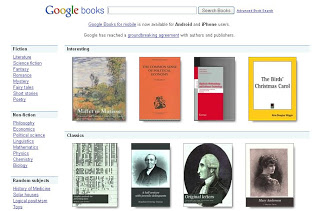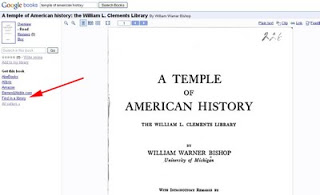 The University of Michigan is partnering with Google on the Michigan Digitization Project to scan the print collection of the University Library. Scanned books from the University of Michigan can be searched in the Mirlyn library catalog and on Google Book Search. Google Book Search, which searches the full text of millions of books, will provide snippets of page results from copyrighted works and full text results for materials that are out of copyright.
The University of Michigan is partnering with Google on the Michigan Digitization Project to scan the print collection of the University Library. Scanned books from the University of Michigan can be searched in the Mirlyn library catalog and on Google Book Search. Google Book Search, which searches the full text of millions of books, will provide snippets of page results from copyrighted works and full text results for materials that are out of copyright.
 Although the Clements Library is not currently part of the Google project, here are five ways that Google Book Search can be useful to Clements researchers:
Although the Clements Library is not currently part of the Google project, here are five ways that Google Book Search can be useful to Clements researchers:
1. Find a starting point for your research. Get an introductory understanding of a historical topic and see what kinds of sources may be relevant for further study. Since Google Books searches the full text of published books and magazines that have been digitized by this project, it will often yield higher-quality information than general search engine results. This can lead you to further books and manuscripts, including Clements Library materials which you can use in person at our library.
2. Find obscure biographical information about an individual through listings in directories, genealogies, and other printed sources in Google Books. For example, the Clements Library has the Fyffe family papers, 1756-1847. One member of the family about whom little was known was David Fyffe of the 46th Regiment of Foot. A search for “David Fyffe 46th” in Google Book Search retrieved information about his family estate, his regimental history and dates of promotion, and an obituary listed in the Gentlemen’s Magazine.
3. Track down an unattributed quote by searching for a phrase. For example, an unsigned poem in the Owen Lovejoy papers began with the lines “Once there was a little boy that lived in a cottage by the wood / ‘Twas on the edge of the prairie wide his father’s cottage stood.” Searching some of the main keywords in the poem led to a Google Books result for the title Minstrelsy of Maine: Folk-songs and Ballads of the Woods and the Coast, by Fanny Eckstorm. This book, found in the University of Michigan Library system, contained a different version of the poem with further information about its history.
4. Look for references to Clements Library materials in published secondary sources. Since Google Books searches the full text of books, references in footnotes and bibliographies can be found. For example, the Fyffe family papers from the Clements Library have been cited in several published works that can be found in Google Books, including Domesticating Slavery, by Jeffrey Robert Young; Scotus Americanus, by William Ranulf Brock; and Nation and Province in the First British Empire, by Ned C. Landsman.
5. Read full-text copies of books in the public domain, and get limited views of many copyrighted works. Some books owned by the Clements Library have copies in other libraries that have been digitized, so it’s worth checking to see if it’s already online. Google Books can also be a source for finding early publications about the Clements Library, such as this full-text book from 1922, A temple of American history: The William L. Clements Library by William Warner Bishop.
 Find a book in Google Books and want to know if the Clements Library has it? Click on the link “Find in a library” and look at the owning libraries listed for that book on Worldcat.com. Enter your zipcode to find the copy nearest you, or look for “University of Michigan, William Clements Library” in the list of libraries to see if we have it.
Find a book in Google Books and want to know if the Clements Library has it? Click on the link “Find in a library” and look at the owning libraries listed for that book on Worldcat.com. Enter your zipcode to find the copy nearest you, or look for “University of Michigan, William Clements Library” in the list of libraries to see if we have it.
Like any initiative, the Google Books project has its flaws, as this article from the American Historical Association points out. However, if carefully used it can be an invaluable tool for historical research. Also, remember that anything on Google Books can also be found in a library, as well as much more that is not online. Even in this digital age, the physical library can still be the best place to do research, and here at the Clements Library, we firmly believe in the enduring power of the written word.
